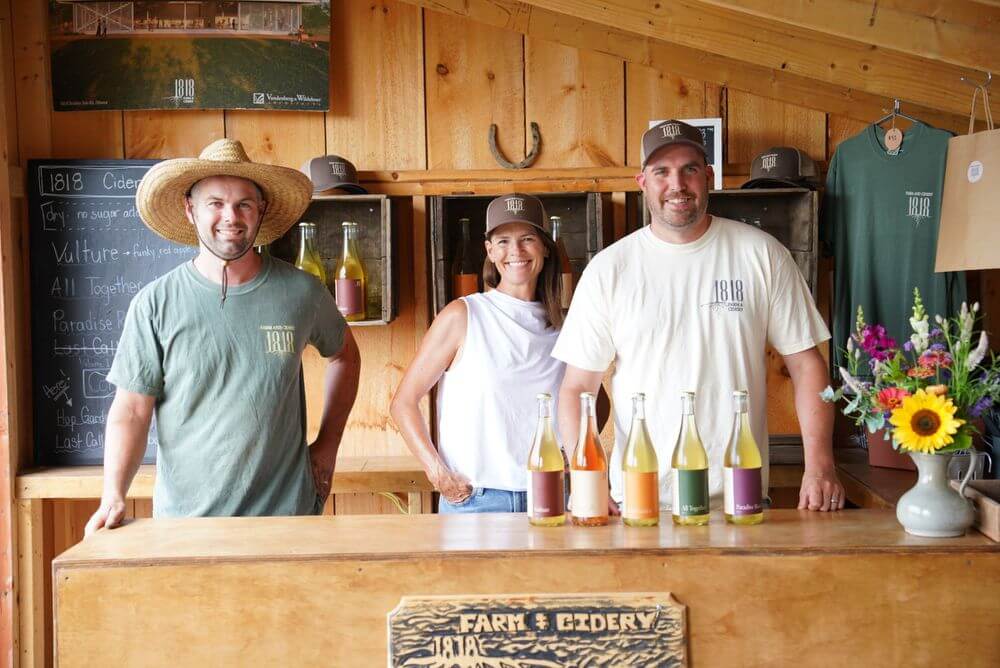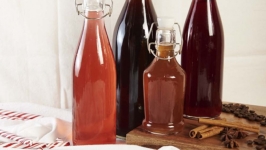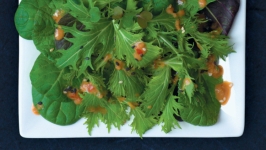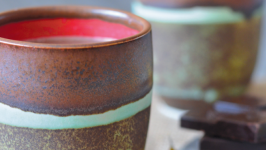The Apple of My Eye
To the west of Ottawa, two newcomers to the age-old craft of growing good apples are re-discovering the joys of heirloom varieties. At Old Huntley Orchard, just outside Carp, owners Samantha and Curtis Lee grow 35 varieties, including some that date from the 17th century, while nearby at 1818 Farm and Cidery, Wes Hunter is using heirloom apples from his property and those wild harvested across his neighbours’ land to create ciders in the style of wine. Heirloom apples are a niche market, as consumer palettes and expectations become increasingly trained to expect the six most common varieties found in supermarkets: Granny Smith, Gala, McIntosh, Honeycrisp, Golden Delicious and Fuji.
“We understand there are several factors that result in fewer heirloom varieties being available in current commercial markets,” Samantha says. “They are less profitable to produce on a large scale, they can be less visually appealing depending on variety, and they don’t always fit [customers’] expected size and shape range. In our opinion, the public has come to expect apples that are very specific in size, shape, colour and flavours.” At these two farms, you’ll find something a little different.
Now in its second year of production, 1818 Farm and Cidery is ideally placed to serve the hungry citizens of Carp, Kanata and Stittsville. It is just an apple’s throw from all of them. And apples they have — more than 14 different varieties and 350 trees.
1818 is also a working farm, producing a vast array of luscious organic vegetables alongside all those apples. And it’s a family affair.
Denise Hoppner is the Jill of all trades, lending a hand wherever needed, from harvesting to weeding, building cardboard boxes and sticking on labels, and being a cheerful face front-ofhouse at the farmstand on Richardson Side Road. She works alongside her son Karl, the man behind the farm operation, who is responsible for the perfectly ordered vegetable beds and the greenhouse with rows of tomato plants and cucumbers, pendulous juicy fruit hanging and ready to harvest.
Then there’s Wes Hunter, Denise’s son-in-law, who is behind the cider operation. A veteran of the hospitality industry and with a background in wine production and a sommelier accreditation in his back pocket that he won when he was 23 years old, he’s found his calling in making apple ciders that are subtle and sophisticated, far closer to wine than scrumpy. The fourth team member is Peter Bissett, the orchard manager, not quite family but a vital member of the small group. He cares for the newly planted apple trees, gently encouraging them to grow into beautiful, balanced, easy-to-harvest shapes.
1818 refers to the year the land was surveyed. It’s a 25-acre plot with 16 acres in production. Karl grows a wide variety of vegetables on one and a half acres and in a 3,000-square-foot greenhouse. He sells at the Carp, Westboro and Barrhaven farmers’ markets, with occasional appearances at Landsdowne, at the farmstand, and through a three-season Harvest Box program, available for pickup at the farmstand alongside fresh bread, eggs and chicken.
The remainder of the land is home to more than 70 heritage apple trees and 300 or so baby trees planted over the last three years. The youngsters are painstakingly trained by Bissett, using metal and plastic stays to separate the branches and strings to gently guide their growing direction. The idea is that the trees should grow wide with two to three branches on every level. They’ll begin producing after the fifth or sixth year. Each was planted in landscaping fabric to suppress the weeds around the tiny trunk and in a large saucer of wood chips for moisture and weed control. The result is the tidiest orchard you might ever see.
There’s a large building on a small hill that overlooks the land. The 7,000-square-foot former post office from Kanata North is being re-purposed as the cidery. Come summer 2025, this is where Hunter will make and package his special juice and visitors can enjoy cider tastings and food while visiting the farm. “The food program at 1818 will focus on fresh ingredients from the farm and locally sourced products from around our community,” Hunter says. “The menu will be small, and the food will be light, approachable, and seasonal. Handhelds, flatbreads, salads and comfort foods will change to match what is currently being grown.” Denise’s husband, Ken Hoppner, is in charge of completing the construction project for the cidery.
This year is the first that Hunter has produced cider for sale. Last fall, he put out a community call looking for apples since his own orchard is largely immature. “I received over 100 messages from people with trees,” he recalls. I spent two and a half months wild picking all over Corkery, Stittsville, Carp, wherever there are trees. I also picked crab apples as they have an acidity I love. While they tend to be small, the rewards are worth it.”
Hunter makes cider differently. His bottles have no added sugar and are made naturally, “letting the characteristics of the apples shine through,” he says, much like grapes in making wine. He’s making dry ciders aged in barrels for at least five months.
Last fall, the months of foraging produced a cider called All Together. It’s an allusion to the forging community. It has no added yeast — relying on the wild yeasts found naturally on the skins — and was aged in pinot noir barrels. It has low carbonation, unlike most commercial cider. In other words, it’s not terribly fizzy. It has floral notes and has picked up nuances from the pinot noir barrel wood.
Paradise Road cider uses apples picked from the heritage trees on-site. Aged in chardonnay barrels, “with notes of vanilla and brioche, it’s basically a chardonnay made with apples,” says Hunter, “and would pair well with white fish, pasta with a creamy sauce or a soft cheese.”
His third cider is called Hop Garden, and it’s flavoured with a small amount of hops and finished with ginger juice. Slightly sweet, it has floral and tropical notes with a great balance of acidity. “This one really worked,” he says with a grin.
Vulture is “a cider I want to age for years,” says Hunter, and it would be a good substitute for red wine to pair with burgers, steak or ribs. It has higher carbonation and is more intense than any of the others. Named after a vulture, with whom he had a daily stand-off on the path to the back orchard, “I knew it would be more intense. The acidity will mellow.”
Last Call is the second iteration of a batch that sold out within seven days of launch. The original was flavoured with raspberry and honey. Version two features crushed cherries and could be used as a cocktail base. “It’s a bourbon barrel-aged crabapple cider, aged on cherries and has no carbonation. It’s a bit sour, so perfect for cocktails,” Hunter says.
Each bottle has a coloured label designed by Hunter himself. “Many people won’t remember a name,” he explains, “but most will recall a colour.” He chose a photo of a vegetable from last year’s harvest and isolated a colour pixel from that shot — a purple beet for the deep red label on Paradise Road or the rich yellow of a spaghetti squash for Hop Garden. Then he stuck 12,000 of them onto bottles.
“I made a product that I’ve always wanted to make,” he says. “The kind of product you find in New York City or Vermont. And I’m so excited for next year because now I can have more fun because the basics are done. I feel like a kid finding what he really wants to do in life.”
1818 Farm and Cidery
1811 Richardson Side Rd., Carp
1818farmandcidery.ca | @1818farm_cidery
Old Huntley Orchard
Drive 15 minutes down the road from 1818 Farm and Cidery and you'll find yourself at Old Huntley Orchard, where Samantha and Curtis Lee and their two children, tend more than 1,500 dwarf and semi-dwarf trees, closely planted and trained vertically, with wide grassy lanes between them. Their farm is just four and a half densely planted acres, but it produced nearly 13,000 pounds of apples last year. “We were surprised last year by the size of the harvest,” Samantha recalls.
For Samantha and her husband, it’s all new. They bought the farm in December 2022 and are still learning the ropes. Neither has any experience in farming, but with the help of the previous owner, who has moved from Carp to nearby Almonte, what was new will quickly become part of the cyclical nature of life on a farm.
The couple didn’t intend to buy a large commercial apple orchard, but they came upon the farm when their house purchase in Arnprior fell through. “We stepped into the house, and it was perfect,” says Samantha. “It’s a great place to raise kids and convenient for my husband, who works in Nepean.”
Now, they farm apples and rent a small piece of land from a neighbour to grow vegetables to complement the offerings in the on-site farm store.
Squash, pumpkins, lettuce, beetroot, cucumbers, tomatoes, peas, beans, garlic and onions will join the apples, jams, cider, eggs, apple products, local pickles and honey on the shelves.
Old Huntley has some dedicated customers. One in particular comes only to buy the Gravenstein variety. This Danish apple, developed in the 17th century, is tart and is mainly used for cooking as it does not keep well. The gentleman comes to the farm once weekly while in season, and the Lees keep the doors to the store open an extra half hour so that he can swing by after work.
Others come to buy just a couple of apples. The Wolf River variety can weigh as much as three pounds, enough to make a whole pie. At last year’s Navan fair, the Lees won the prize for the largest apple with a Wolf River that weighed 1.8 pounds. However, for Samantha, Ginger Gold, the first yellow apple to ripen in the fall, is the winner. “It’s big, it’s yellow and it’s not too sweet nor sour.”
Old Huntley Orchard
4625 Carp Rd., Carp, Ont.
oldhuntleyorchard.ca | 613.795.9966 | @oldhuntleyorchard

















